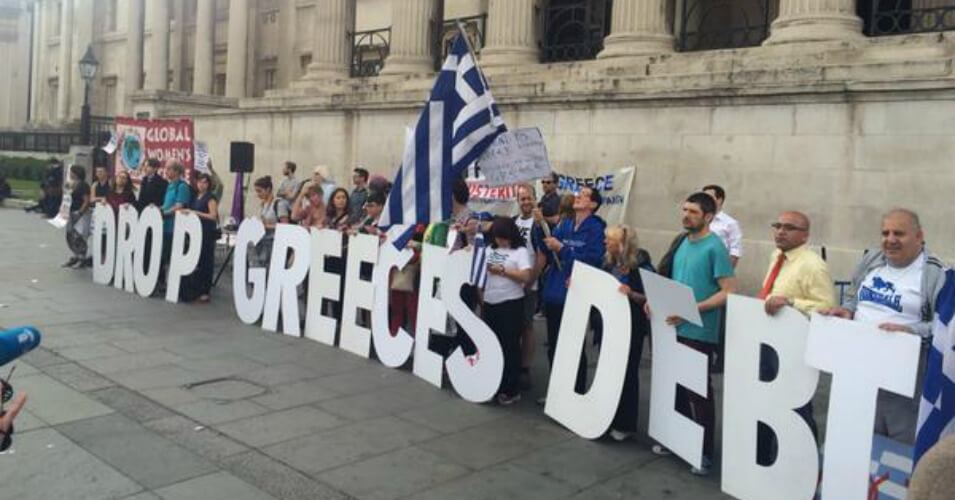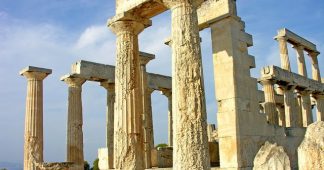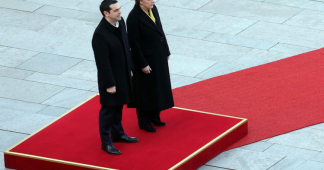At the entrance I was met by an effusive Michel Sapin. A jovial man in his early sixties, Sapin was the only finance minister in the Eurogroup who did not speak English. But he made up for it with a warm character. Typically Latin in his hand gestures and body language, he made me feel genuinely welcome as we walked to his office.
Once we were sat down with our aides and translator, I was asked to make an opening statement, which I used to outline the main items on our economic agenda, my debt-restructuring ideas, including the non-paper , which Sapin seemed keen to see, prefaced with an allegiance to Europeanism and my contention that the Greek crisis, and its perpetuation, was wounding Europe unnecessarily. I explained that I was proposing a new relationship between Greece and the EU based on Jean-Jacques Rousseau’s concept of a contract between equals.
Michel’s response was that of a brother-in-arms. “Your government’s success will be our success. It is important that we change Europe together; that we replace this fixation with austerity with a pro-growth agenda. Greece needs it. France needs it. Europe needs it.”
It was the cue I needed to put forward the basic elements of the Modest Proposal , which Stuart Holland, Jamie Galbraith and I had been working on for years. I explained how the ECB could partially restructure the whole of the eurozone’s public debt without haircuts and without asking Germany to pay for everyone else or guarantee the periphery’s public debt. I outlined how investment-led recovery could produce a new deal for Europe by channeling the ECB’s quantitative easing programme into infrastructure projects or green energy bonds issued by the European Investment Bank. Michel listened intently and, when I had finished, declared that such proposals were the way forward for Europe. We had delayed the implementation of such policies for too long, he said. Together we must restart Europe, he thundered. The only thing that Michel did not do was suggest we join hands and rush out to storm the Bastille singing the Marseillaise!
Our discussion, lengthened as it was by the need for translation, lasted around an hour and a half. It was pleasant and free of any disagreement, and coming as it did after such encouraging conversations earlier that morning, I began to put the confrontation with Jeroen Dijsselbloem behind and consider a decent compromise agreement as a real possibility.
As Michel and I were making our way from his office to the obligatory press conference – he speaking in French, which I understand and I responding in English, which he grasped sufficiently – he informed me that Berlin had been in contact. They were very upset that I had come to Paris without also offering to go to Berlin, he told me in a low voice. I was more than happy to go to Berlin too, I told him. The reason I was in Paris and not there was that he had invited me and they had not. My intention was to ask Wolfgang Schaueble to Athens, since he had not invited me to Berlin. Michel smiled. “You should go to Berlin immediately after Frankfurt. They asked me to convey this to you.”
“Sure, happy to oblige. Is this an invitation or a summons?” I asked, only half-jokingly.
“Just go,” he replied, patting me on the back.
In the press room two lecterns stood side by side in front of the French, Greek and EU flags. Michel spoke first and began by welcoming me and saying a few words about the great sacrifices the Greek people had made during the past few years. But then, quite suddenly, his tone changed. The joviality and comradeship disappeared and were replaced with a harshness more familiar from the other side of the River Rhine: Greece had obligations to its creditors, and the new government would have to honour them; discipline must be maintained and any flexibility contained within the current arrangements. Nothing about the new Rousseau-inspired social contract that we had agreed upon. Not a word about ending austerity or adopting public-investment-led pro-growth policies for the good of all of Europe.
When my turn came, I stuck to my prepared statement, which included the following:
“France is for us Greeks not just a partner but also one of our spiritual homes. The very existence of the Greek state owes a great deal to the French Enlightenment that sparked off our own Enlightenment and equipped the Greek national liberation movement with its philosophy and elan. Today, I had an opportunity to outline to Mr. Sapin our government’s plans for reforming Greece within a changing Europe that puts an end to the self-reinforcing debt-deflationary cycle damaging everyone in Europe as we speak. It is our view that to accomplish this we must deliberate in the spirit of the great Europeans who, beginning with Jean Monnet, found practical means to forge mutually beneficial unity out of seemingly implacable discord. We shall suggest to our partners across Europe that we resurrect together one of Jean Monnet’s operating principles. Namely, that if parties sit down at opposite sides of a negotiating table and proceed from long-established positions, there will be little chance of success. But if we sit on the same side of the table and place the problem on the opposite side, success is certain in a Europe with so much room for mutual prosperity. Today we sat on the same side of the proverbial table. It is our government’s intention to do the same in every European capital, each time placing the problem on the table’s opposite side. Today, starting here in Paris, let me say that I am guided by a single objective: to promote the interests not of the average Greek but of the average European. To ensure that our economic and monetary union succeeds by succeeding everywhere.”
Although I managed to finish my prepared speech lauding solidarity and French idealism, I felt as if I had been punched in the stomach.
As soon as we left the press room, Michel instantly switched back to his amicable joviality, holding my hand as if I were his favourite long-lost cousin. Determined to maintain my exterior poise, I turned to look at him and, faking puzzlement, asked “Who are you and what have you done to my Michel?”
To my great astonishment, not only did he clearly understand what I was saying, he did not seem angered in the slightest either. Instead he stopped, held my arm a little more tightly, adopted a sombre expression and, switching to English almost as if he had practiced the line, shared an opinion of historic importance and sadness: “Yanis, you must understand this. France is not what it used to be.”
Indeed, France is not what it used to be. In the months that followed, the French government and the country’s entire elite proved their inability, as well as their reluctance, to deter attacks on our government that were, in the long term, aimed at Paris. While I never expected them to go out of their way to assist us against their interests, I was ill-prepared for the French establishment’s abandonment of its own interests, which were not served by reinforcing the surplus countries’ domination of fiscally stressed ones. Michel Sapin’s performance that day is an excellent allegory for what is wrong in the French Republic.
In the lift on our way to see Emmanuel Macron, also based at Bercy, Michel confessed that he was not an economist by training and asked me if I knew what his postgraduate thesis had been on. I said I did not. “The numismatic history of Aegina,” he informed me with a smile even broader than the one with which he had first greeted me. My jaw dropped. France’s minister of finance, having just unleashed a surprise public assault on me on Berlin’s behalf, was now trying to bond with me by confessing that he did not know much about economics but was an expert on the ancient coins of the little island off the coast of Attica that Danae and I call home. Irony does not even begin to convey what I felt.
France’s minister for the economy was the opposite of its minister of finance. Where Michel Sapin ducked, deferred and simulated, Emmanuel Macron listened actively and engaged directly, his eyes radiant and ready to display his approval or disagreement. The fact that he had good English and a grasp of macroeconomics as well meant we were soon on the same page regarding Europe’s need for a genuine investment programme that would put its trillions of idle savings to work for the collective good. From my first meeting with him, I regretted dearly that it was Sapin who represented France in the Eurogroup and not Macron. Had they swapped roles, things might have ended up differently.
Comment from W. Hall: This passage shows very clearly how politicians are prisoners of forces they are unable to control. They are not masters in “their own house”. This applies not only to Sapin, who says one thing privately to Varoufakis and another to the media at a press conference. It also applies for Varoufakis, who in front of the press praises Jean Monnet and his achievement whereas in meetings with rank-and-file activists he describes the EU as a cartel. Do we not also see similarities between Varoufakis’ hopeful attitude to Macron and Tsipras’ (acquired) hopeful attitude to Angela Merkel, whom she first flattered only subsequently to betray him, (as is the habitual practice of politicians). But outside the treacherous framework of prescribed politics, Sapin also tried, in his way, to establish a non-political relationship with Varoufakis, a relationship above, or below, politics, based on something else. He apparently did not succeed and there are many who have tried, and failed, in the same way, with Yanis Varoufakis.











